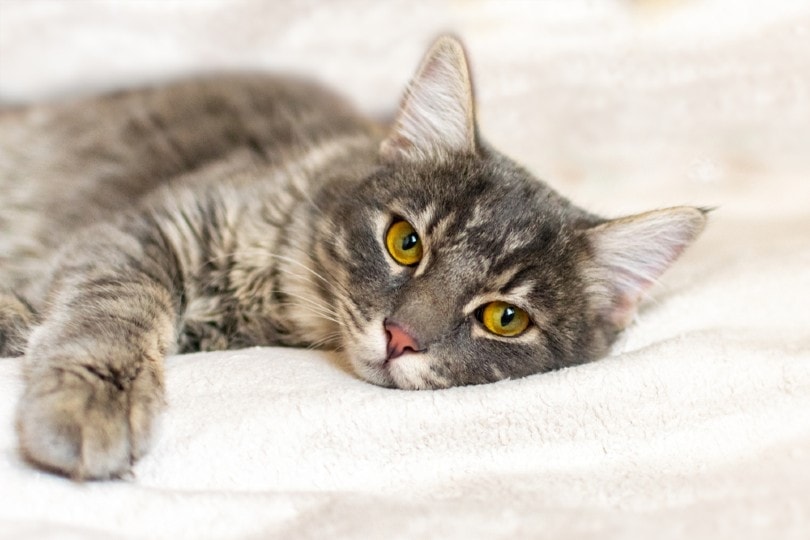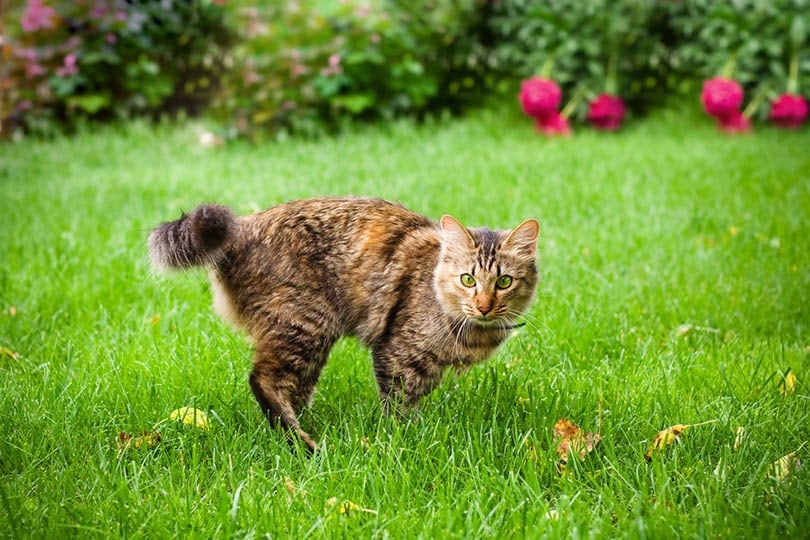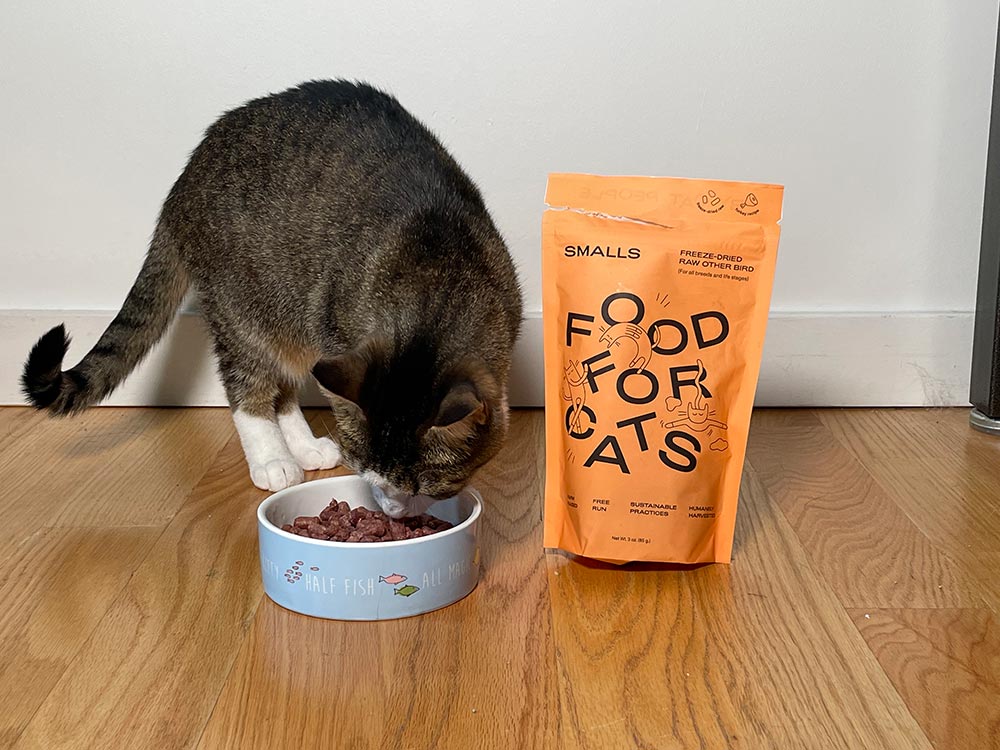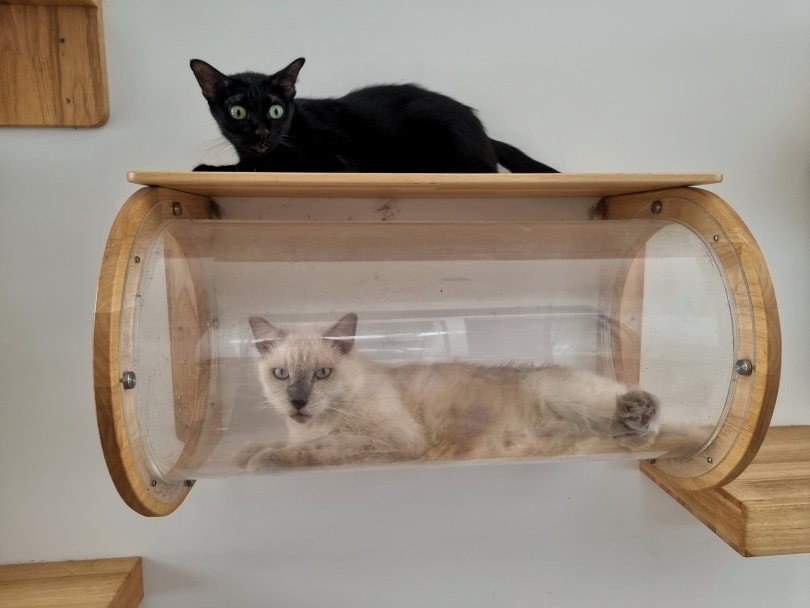Can Cats Eat Almonds? Vet-Reviewed Facts & Safety Tips
Updated on

Almonds are often considered a nutritious snack for humans. However, there are many misconceptions involving the nuts and their safety regarding cats. According to the ASPCA1, the type of almonds sold for consumption in the U.S.A., which are sweet almonds and are the seeds from the tree Prunus dulcis variety dulcis, are not toxic to pets. While sweet almonds are not toxic to cats, you should avoid feeding them to your feline because they provide no nutritional value and can lead to various health problems. Sweet almonds are not part of your cat’s regular diet, so the high fat content can easily cause gastrointestinal upset.
However, bitter almonds, which come from the tree Prunus dulcis variety amara, are toxic to cats. Bitter almonds are not typically sold in the U.S.A., though. If they are, they should be marked specifically as such because this particular type of nut contains cyanide, which is poisonous to cats.
Are Almonds Toxic to Cats?
Sweet almonds are not toxic to cats. These are the type typically sold in the U.S.A. for human consumption. Usually, if something is labeled as just “almonds,” then they fall into this category. These almonds do not contain any toxins of any sort; therefore, they are technically safe for cats to eat in tiny amounts.
However, that doesn’t necessarily mean that you should feed your cat almonds. While they do contain fat, which is something cats need in small amounts, they are very rich in fat. This can cause significant problems if your cat eats too many almonds over a long period. A high consumption of these nuts could lead to problems of excess weight and poor quality of gut microbiota.
That said, some almonds are indeed toxic to cats. Bitter almonds include cyanogenic glycosides, which are natural toxins found in many plant seeds. While a bit of this toxin usually doesn’t cause a problem, it can cause your feline to suffer from something similar to cyanide poisoning. This can cause severe signs, such as gastrointestinal problems, abdominal pain, dilated pupils, and difficulty breathing. It can be deadly to felines unless they are given the appropriate medical treatment.
What Are the Downsides of Feeding Almonds to Cats?
While the usual almonds you find in the store are not toxic to cats, that doesn’t necessarily mean that they should be given to cats regularly. Almonds are not part of a cat’s diet and, therefore, eating them can cause digestive upset. Additionally, the size, shape, and hardness of the almond could lead to choking or gastrointestinal blockage, especially shelled almonds, which requires veterinary intervention.
Gastrointestinal signs include vomiting and diarrhea. This is due to the type of fat found in almonds, which cats are simply not always equipped to digest properly.
Furthermore, many almonds contain seasonings, such as salt or spices. Cats can be at risk of salt toxicity if they ingest a high amount of salt and don’t have free access to water. However it’s highly unlikely that this situation occurs just by eating salty almonds.
Other toppings and additives can also be harmful. Some spices can irritate your cat’s mouth and digestive system; and chocolate, which is a common almond coating, is toxic to cats.

What Happens if a Cat Eats Almonds?
Typically, if a cat eats one or two almonds, nothing will happen. However, they may have trouble processing a large amount.
That said, there is little nutritional value in almonds that cats need. Cats should get all the nutrients they need from their complete and balanced diet that you feed them. Furthermore, cats, being strict carnivores, are not meant to be fed plant material. For this reason, they must obtain the protein and the little fat they need from a meat source instead.
If a cat consumes too many almonds, then they may end up with digestive problems. The amount that cats can safely eat is not well established, so it’s better to avoid them altogether..
Still, even if your feline accidentally ate a couple of almonds, it probably isn’t going to be much of a problem. Almonds that are typically available at the store are safe for cats to eat, as long as they aren’t eaten in high amounts for an extended period. It is the prolonged consumption of almonds that is the problem.
Final Thoughts
Sweet almonds, the kind commonly sold for human consumption in the U.S.A., are not toxic for cats to eat. However, that doesn’t necessarily mean that they are safe to be eaten by your cat. Almonds don’t have many benefits for cats, and the high amount of fat can cause gastrointestinal upset.
If your cat accidentally eats an almond, you likely don’t have anything to worry about. On the other hand, bitter almonds contain toxins, but these are usually clearly labeled. Typically, you only find these almonds at specialty stores. Generic almonds are sweet almonds and are typically the ones eaten by people.
Looking for more tips on what your cat can eat? Check out:
- Can Cats Eat Tomatoes? What You Need to Know!
- Can Cats Eat Carrots? What You Need to Know!
- Can Cats Eat Ham? What You Need to Know!
Featured Image Credit by: Mockupo, Unsplash













